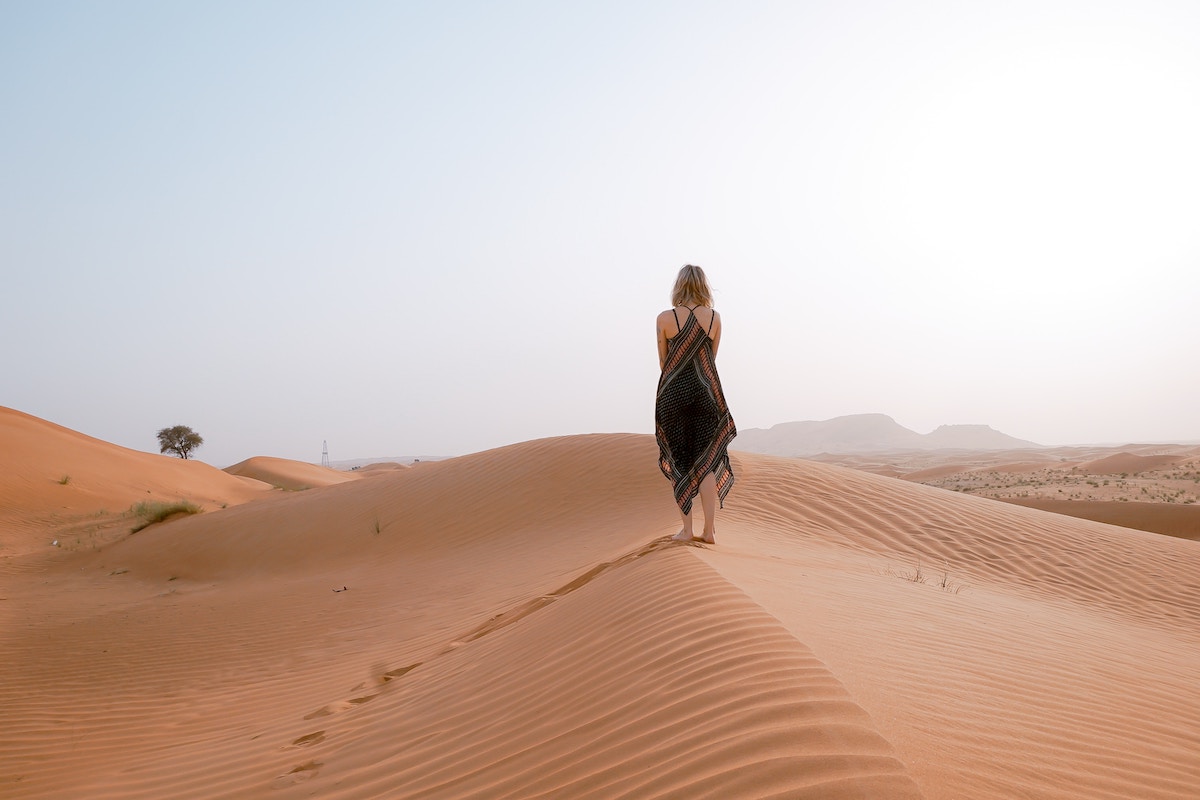Art and Culture
Sheep and Mirrors: On Being Social
What is it about other people that bestows such joy, such comfort, such indispensable meaning on our lives?

I’m pregnant with our third child when I read Marlen Haushofer’s 1963 novel The Wall. It’s a terrifying thought experiment where the main character is confronted with the possibility she’s the last human being alive.
As she documents her fight for survival, I wonder if I’d have the will to carry on if everyone I knew was dead and I had no hope of ever seeing or loving another human again. I suspect every remaining joy in the world would suddenly lose its lustre. But why? Is the ability to interact with other humans really so vital that I’d rather die than live alone?
As a wife and mother of three young boys, as someone who thrives on communicating, and lives in an age of astonishing connectivity, I suspect the notion of total solitude is more unfathomable to me now than at any other point in my life.
I live on an island in a country full of geographically isolated (but increasingly connected) towns, where internet access is seen as a necessity, not a luxury. In this place, broadband speed and reach are key election issues; the overwhelming majority of households (86 percent in 2016–17, according to the ABS) enjoy internet access; and there are more mobile handset subscribers (26.7 million at the end of 2017) than people (around 25 million).
I may dream of a moment’s peace, but if I find one, I’m quick to realise how accustomed—even attached—I am to the noise: to the conversations and communications that characterise my waking hours. I may set aside time to write, but a session without interruption (“We left a tub of quince paste on your doorstep x”) or distraction (“German police rescue man being chased by baby squirrel”) is about as likely (“Friday Fare Frenzy 8 hour sale on now!”) as a reader completing this essay without taking a call, checking a post, or flicking between tabs.
Australia Now, and Then
It’s a Tuesday afternoon and I’m alternating between messaging a friend, emptying the dishwasher, planning dinner and typing questions (What is the furthest planet from earth?) from our seven-year-old son (What if all the volcanoes on earth erupted at the same time?) into the search engine on my phone.
We learn that in 2015 a planet was found 13,000 light-years from Earth, that there are 1500 active volcanoes on the earth (not counting those hidden under the ocean) and that between ten and 20 erupt each day (although I have no way of knowing whether or not any of this is true). A geologist from a US university says it’s unlikely “Earth as we know it” would survive if all of those volcanoes erupted at once, because it would be suffocated with ash. My son seems strangely delighted by the thought.
While our children take the wonders of the internet for granted, I can still remember the first time I encountered the concept of the world wide web. A girl I went to school with boasted that she could write to her cousins in England on her computer in Australia, and make the letter appear on their screen. Of course, I didn’t believe her. Even if she hadn’t already ruined her credibility the previous term by claiming her parents were buying her a pony, I’d have been skeptical; the notion was surely far too fanciful to be fact.
And now. Now the fact we can still send real paper inscribed with physical ink from one place to another is starting to seem equally fanciful. Now we forget there was ever a time we had to be at home to answer our phone, or at an office to do our job, and we forget how vast and isolated our country is, because in the virtual world the distance disappears.
I often wonder what my primary-school self would have thought of the world I live in now. Would she have believed I could live in Tasmania, have colleagues in Sydney, and publish articles without printing? Or that my husband would work for a London-based company whose billionaire boss has been a tourist in outer space? Or that I’d no longer wear glasses, because a stranger had burned the surface of my eyes with lasers to give me perfect vision?
What if I told her that in the future I’d broadcast trivial—and personal—thoughts and experiences to an ill-defined mass of friends and acquaintances, for reasons I couldn’t fully explain to myself, let alone to her? That I’d allow multi-billion-dollar companies, which I had no reason to trust and every reason to fear, to collect and use these details for their gain? That billions of people would do the same, accepting outrageous hoarding, unethical opacity, steadily amassing power—because we were more afraid of somehow “missing out”?
Exploiting an Inherent Need
In an age where we have taken “sharing”—if not facts, at least stories—about ourselves to a new level; where memorable experiences can seem incomplete if we don’t pretty them up and present them to the world; where we are connected to so many people and places and sources of information (and misinformation) so much of the time; I suspect the sudden and total isolation depicted in The Wall would be even more shocking than Haushofer could have imagined.
Total solitude. It’s hard to imagine anything more terrifying, but why? What is it about other people that bestows such joy, such comfort, such indispensable meaning on our lives? And why is my first instinct, when I experience something beautiful or moving, or funny or delicious or profound, to want to share it (and, I admit, have people “like” it).
Whatever the reason, I’m not alone. A Sensis Yellow Social Media report released last June shows nearly eight in 10 Australians now use social media, and 35 percent access it more than five times per day. The Merriam-Webster’s secondary definition of addiction includes “strongly inclined or compelled to do, use, or indulge in something repeatedly,” and uses chocolate as an example. It strikes me as strange that reading and posting casual messages could have addictive properties. Perhaps it taps into a fundamental human need, one with a lure akin to, perhaps even greater than, chocolate.

In his book Joined-up Life, Australian ethicist Andrew Cameron suggests we’re generally unable to remember the point in our lives when we became “social beings” because we’re born into networks of relationships and our lives “mainly consist of a constant interplay between others and ourselves.” We’re also “hard-wired” to interact with and influence each other. Further, “every group we ever join becomes a school of moral formation,” often without us realising it. “We imagine ourselves to be ruggedly individual, choosing and planning our destinies,” Cameron says, but we are far less rational—far more impressionable and emotional—than we’d like to believe.
Exposing an Inherent Weakness
Cameron uses the perception test conducted by social psychologist Solomon Asch in the 1950s, which asked volunteers which set of three lines was the longest, to illustrate the alarming power groupthink can have over us. In the rigged groups, where seven people pretending to be participants gave an obviously wrong answer, a third of the genuine subjects eventually followed suit. “In even a tiny task with unknown people, we’ve a strong desire to conform to the opinions of a group,” he says.
I think of my Facebook newsfeed. At one stage, everyone seemed to be shunning shampoo and red meat; more recently, disposable coffee cups were a source of righteous indignation. A few months later, tired of greasy hair and dirty cups, the furore faded, replaced by campaigns against the evil…plastic straw.
The more I think about it, the more fitting the description “a school of moral formation” is. If you want to be socially progressive, you have to vote yes to marriage equality, have a rainbow profile pic and support a woman’s right to choose. If you’re a Tasmanian who cares about the environment, you have to be against the cable car proposal; if you care about Indigenous rights, you have to shun Australia Day and use Indigenous place names in your location hashtags.
If you want to be authentic—to attract as many “likes” and as much “love” as possible—you craft stories about your struggles as well as your joys—but only in a way that will generate empathy, admiration, compassion. You express anger, too, but only when it’s consistent with a tide of popular opinion—the goal is to be liked, and to avoid being judged at all costs. And so our stories become strategic, our expressions of vulnerability and outbursts of anger become performative. The scary thing is that our careful crafting becomes so natural we deceive even ourselves.
We like to associate peer pressure with impressionable and insecure teens, we like to think we have graduated to independent thought and behaviour with age, but do we ever really escape it? For all our talk of independence, aren’t we all still following (or at the very least, courting) some kind of crowd?
“Modern Westerners mostly hate to picture themselves as following anything or anyone,” Cameron says. “I may follow ‘my own way’ or ‘my heart,’ with my decisions finally pivoting on ‘being true to myself’… [but] we’re not really masters of our identity. Those thoughts, feelings and habits that comprise our identity and make us who we are haven’t come from nowhere… Whether or not we realise or care to admit it, we’re already following something.”
It’s strange—even irrational—the lengths we’ll go to in order to secure the approval of our friends… and friends of friends… and strangers. We might deny it, we might claim we’re “networking” or “building a personal brand” for career reasons, we might claim that “what you see is what you get,” but I’m not sure that’s even possible.
I live a block from a corner shop, but even if I knew I wouldn’t run into anyone who’d recognise me, I still wouldn’t nip down in my pyjamas for milk. But why not? Why do I, do we, care so much about what others might think—even when it’s trivial? Is it good? Bad? Necessary? Some kind of evolutionary tribe-mentality survival-mechanism that promotes cohesion and community over individualism and chaos?
Cameron suggests it’s more than that. As a Christian, he believes there is a far more profound reason we are “hard-wired” for relationships. According to Australia’s most prevalent (if declining) religion (52 percent identified as Christian in the 2016 census), human beings are made in the image of a relational God (Father, Son, Holy Spirit). The Bible claims our relational nature is fundamental to who we are. We were designed to be in relationships—with each other and with God; we were designed to be followers—of God alone; but are now inclined (much like straying sheep) to follow anything but him, and love ourselves above all else.
Social analyst Mark McCrindle says most behavioural experts consider narcissism “a condition not of biology but society” (it’s the social context, not genetic factors, that are causal)—but he’s not so sure. He suggests the apparent rise of narcissism (evidenced by an increase in “narcissistic-type behaviours” such as selfie-posting) is more a case of social media “highlighting its existence” than creating more of it.
Whatever the reason for our love affair with social media, whoever and whatever we follow, we do well to remember we’re all sheep to some degree. Further, many of the people and ideas we follow online are grounded more in fiction than fact: the family that only ever enjoys wholesome activities and healthy food; the social or environmental cause that’s presented with simplistic, one-sided force; the traveller who only ever encounters beauty and joy. In the online world of fleeting exchanges and continuous scrolling, there’s abundant room for making assumptions and jumping to conclusions, but almost none for complexity or nuance.
There’s much talk, but how often do we stop to really listen? How often do we come away with new truth or insight or understanding, and how often do we come away with fresh reinforcement for the same old assumptions? Then again, how can communication using a medium that’s designed to give instant gratification—and dictated by an algorithm that surely prioritises commerce over community; that exploits deep needs and exposes inherent weaknesses—be any other way?

I should just close my account. But “they” would still have my data, and although I’d be free from swathes of unhelpful, unnecessary noise and judgement, guilt and debate, I’d miss out on much too. Communication that promotes superficial, self-indulgent broadcasts and herd-like following might be a fraught and ironically primitive medium compared to the richness of the face-to-face conversations, but it can still connect us, and it really can enhance our lives.
Our addiction to social media and our willingness to give our personal data to corporations so freely may represent a kind of collective insanity; the way we use it may reflect a disturbing tendency towards, on the one hand, following the herd and, on the other, obsessing over our own reflections; but I can’t help but think the competing desire and underlying need—to create and experience community—is a noble one.
Australia Now, and Then
Our third child is now one year old. I imagine the kinds of technology he will take for granted; the new ways of communicating that will be second nature to him. I wonder how different his Australia will be from mine.
Whatever the answer, I suspect that communicating in more valuable, meaningful ways won’t be dependent on better developers, better technology or more ethical corporations, it will be dependent on the users. And although there’s much to bemoan, there are grounds for optimism too.
In 2018, Australian politics experienced yet another leadership spill, and our unique brand of humour (a Kath and Kim skit where the $500 question was the name of our nation’s PM…) saw people from all sides to come together and yes, complain, but also laugh, not only at our leaders but at ourselves. And earlier that year our nation, together with much of the world, helped, hoped, agonised and prayed while a group of foreign children in a foreign country were trapped in a flooding cave—and only really breathed again when the rescue was complete.
On a more local level, social media connects people in remote areas with people in cities, stay-at-home parents with office workers, people who are sick with people who are well, people who are young with people who are old. On my neighbourhood’s “good karma” Facebook page and others like it, everything from lemons and chicken bones to worm poo and pet-sitting is given and received by strangers, who often become friends. Perhaps the neighbourhood bonds we started losing to technology are starting to return, because of it.
To fully realise such benefits, we need to use social media as a supplement, not a substitute, for in-person interactions, and focus our sharing on what will interest and benefit others (a book recommendation, a barbecue invitation, a roster to help a sick friend) over ourselves (another selfie, another #humblebrag, another quest for “likes”).
McCrindle suggests certain cultural factors are already at work in our favour. In his view, our preference for keeping things “fair dinkum” and “not blowing your own trumpet” is evident online as well as off. Further: “The tall poppy syndrome remains a powerful social norm to ensure that no one gets ‘too big for his boots’ or is ‘putting on airs’ [while the] Australian values of community mindedness and looking out for each other ensure that empathy remains strong and narcissism is kept at bay—even [in] this great screen age.”
Writing about “diverse curiosity”—the state our minds are in when seeking new knowledge—which predicts work performance better than nearly all personality measures, most ability measures, and emotional intelligence, Australian Catholic University Professor Jim Bright says an open mind and a sense of humility are key. “Diverse curiosity requires [a sense] that you do not know it all, that [there] are different and maybe better ways of doing things.”
I think back to the questions I field from our seven-year-old each day—
“Mum, if you break your neck does your head fall off?”
“Mum, what would you do if you saw a dragon?”
“Mum, why does the world even exist?”
—and the hunger for knowledge they express.
What a shame that the thing children often learn from their relentless questioning (implicitly, of course) is to stop asking. What a shame they move so quickly from wondering about the world to worrying about what it will think of them, to working on their image.
Bright notes that diverse curiosity is “the opposite of intellectual complacency.” What if our main goal in using social media was to nurture this kind of curiosity? Relationships expert Doctor John Gottman says people can connect with each other by asking meaningful, open-ended questions and being fully present (really listening) to each other. What if we applied this philosophy to our online interactions as well?
We frequently use the internet to ask questions and learn more about the world, but we rarely use social media to ask questions and learn more about each other. Perhaps, if we can spend less time trying to look good and be liked, we’ll spend more time really listening and connecting. Profit-driven companies with ad-driven agendas will still be using us—we’ll still have groupthink and our own self-centred motives to contend with—but if it brings us closer together, it might just be worth it.






